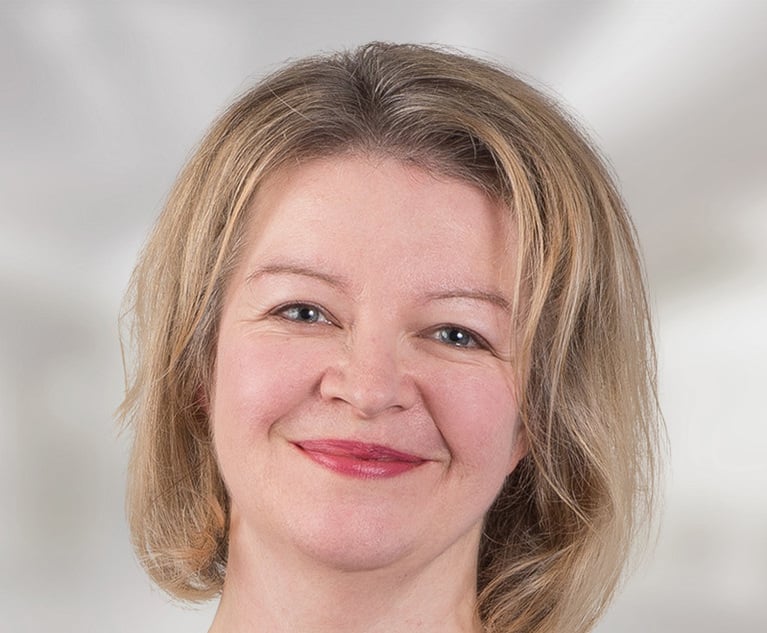Norton Rose management in bid to 're-engage' with City partnership
Firm's management seeks to reconnect with City partners after years of rapid overseas expansion
November 29, 2015 at 07:03 PM
4 minute read
Norton Rose Fulbright is holding meetings for City partners in a bid to make them feel more involved in shaping the merged firm's strategy.
The meetings – chaired by Europe, Middle East and Africa (EMEA) head Martin Scott – are intended to give partners a forum for voicing any concerns and make them feel more connected in the wake of a series of ambitious international mergers.
The first meeting is believed to have taken place after Scott stepped into his leadership role at the start of this year, with another taking place a few weeks ago.
Scott plans to carry out these meetings across EMEA but dates and locations are not yet known.
It is expected that the meetings will take place at least on a quarterly basis but it is not obligatory to attend.
Only London partners have been welcome to join the City meetings, with global management allowed only by invitation. It is understood that the firm's managing partner Peter Martyr was invited to both meetings and attended the most recent one.
At that meeting, it is understood he briefed partners on the firm's global strategy, discussing the focus of future investment and the state of the business, as well as chargeable hours.
It seems like management has taken its eye off the ball as it is too busy expanding overseas
Norton Rose went through a succession of major mergers between 2010 and 2013. First it merged with Australian firm Deacons in 2010, then in 2011 it merged with Canadian firm Ogilvy Renault and leading South African firm Deneys Reitz, those were followed by a second Canadian merger with Calgary-based Macleod Dixon.
In 2013 it did its biggest merger yet tying up with Houston's Fulbright & Jaworski to create a firm with turnover of nearly $2bn (£1.26bn).
Former partners argue many City partners feel isolated and detached from the firm's stategy as Norton Rose Fulbright beds down following its rapid overseas expansion. They are also believed to be unhappy with profitability levels.
"There have been partner meetings to re-engage with the London partners. A lot of them aren't happy with the level of profitability. It seems like management has taken its eye off the ball as it is too busy expanding overseas," said one source close to the firm.
Norton Rose merged with US firm Fulbright & Jaworski in 2013 which saw it gain 11 offices and nearly 800 lawyers in the US.
In 2014, the newly merged firm launched an office in Rio de Janeiro, its 55th office worldwide.
A Norton Rose partner said that while the London partnership was always "briefed on strategy changes" that the new initiative was a welcome move.
"I think it is important in any people business to keep people informed and it is important to do this face to face. I have not attended the two meetings but I hear that they were well received by the partners."
Partners are finding it helpful to hear the strategy from the horse's mouth and understand why it is happening.
Previously, the London partnership had little opportunity to voice their opinions to management, said former partners.
"You would occasionally get videos from the management and we would have departmental meetings or global practice area get-togethers. But there was less direct engagement with senior management."
Another added: "Partners are finding it helpful to hear the strategy from the horse's mouth and understand why it is happening. Previously [department] heads came in and just briefed partners on what was going to happen and it wasn't explained."
Scott replaced Martyr in the head of EMEA position as previously Martyr served as both global CEO and EMEA head. Scott will be in place for a three year term until January 2018.
Earlier this year, Norton Rose abolished the deputy managing partner role as Scott's appointment negated the business need for a deputy to support Martyr.
Tim Marsden had held the deputy post since 2011. He remains at the firm as a partner and head of risk advisory for EMEA.
This content has been archived. It is available through our partners, LexisNexis® and Bloomberg Law.
To view this content, please continue to their sites.
Not a Lexis Subscriber?
Subscribe Now
Not a Bloomberg Law Subscriber?
Subscribe Now
NOT FOR REPRINT
© 2025 ALM Global, LLC, All Rights Reserved. Request academic re-use from www.copyright.com. All other uses, submit a request to [email protected]. For more information visit Asset & Logo Licensing.
You Might Like
View All

Some Elite Law Firms Are Growing Equity Partner Ranks Faster Than Others
4 minute read
Eversheds Sutherland Outgoing Co-CEO to Move to Dubai to Spur Regional Growth
2 minute readTrending Stories
Who Got The Work
J. Brugh Lower of Gibbons has entered an appearance for industrial equipment supplier Devco Corporation in a pending trademark infringement lawsuit. The suit, accusing the defendant of selling knock-off Graco products, was filed Dec. 18 in New Jersey District Court by Rivkin Radler on behalf of Graco Inc. and Graco Minnesota. The case, assigned to U.S. District Judge Zahid N. Quraishi, is 3:24-cv-11294, Graco Inc. et al v. Devco Corporation.
Who Got The Work
Rebecca Maller-Stein and Kent A. Yalowitz of Arnold & Porter Kaye Scholer have entered their appearances for Hanaco Venture Capital and its executives, Lior Prosor and David Frankel, in a pending securities lawsuit. The action, filed on Dec. 24 in New York Southern District Court by Zell, Aron & Co. on behalf of Goldeneye Advisors, accuses the defendants of negligently and fraudulently managing the plaintiff's $1 million investment. The case, assigned to U.S. District Judge Vernon S. Broderick, is 1:24-cv-09918, Goldeneye Advisors, LLC v. Hanaco Venture Capital, Ltd. et al.
Who Got The Work
Attorneys from A&O Shearman has stepped in as defense counsel for Toronto-Dominion Bank and other defendants in a pending securities class action. The suit, filed Dec. 11 in New York Southern District Court by Bleichmar Fonti & Auld, accuses the defendants of concealing the bank's 'pervasive' deficiencies in regards to its compliance with the Bank Secrecy Act and the quality of its anti-money laundering controls. The case, assigned to U.S. District Judge Arun Subramanian, is 1:24-cv-09445, Gonzalez v. The Toronto-Dominion Bank et al.
Who Got The Work
Crown Castle International, a Pennsylvania company providing shared communications infrastructure, has turned to Luke D. Wolf of Gordon Rees Scully Mansukhani to fend off a pending breach-of-contract lawsuit. The court action, filed Nov. 25 in Michigan Eastern District Court by Hooper Hathaway PC on behalf of The Town Residences LLC, accuses Crown Castle of failing to transfer approximately $30,000 in utility payments from T-Mobile in breach of a roof-top lease and assignment agreement. The case, assigned to U.S. District Judge Susan K. Declercq, is 2:24-cv-13131, The Town Residences LLC v. T-Mobile US, Inc. et al.
Who Got The Work
Wilfred P. Coronato and Daniel M. Schwartz of McCarter & English have stepped in as defense counsel to Electrolux Home Products Inc. in a pending product liability lawsuit. The court action, filed Nov. 26 in New York Eastern District Court by Poulos Lopiccolo PC and Nagel Rice LLP on behalf of David Stern, alleges that the defendant's refrigerators’ drawers and shelving repeatedly break and fall apart within months after purchase. The case, assigned to U.S. District Judge Joan M. Azrack, is 2:24-cv-08204, Stern v. Electrolux Home Products, Inc.
Featured Firms
Law Offices of Gary Martin Hays & Associates, P.C.
(470) 294-1674
Law Offices of Mark E. Salomone
(857) 444-6468
Smith & Hassler
(713) 739-1250









